This is the time of year where book and movie critics come up with their “Best of the Year” lists, so I thought it a perfect time to do my own version of same.
These five books—only three of which actually came out this year—are must reading for anyone interested in health, nutrition and diet.
Now before you read ahead, let me make a couple of disclaimers:
There were plenty of great books that came out this year that didn’t make this list. Chief among them are The Virgin Diet by my sister-from-another-mother, JJ Virgin, and the absolutely wonderful Blood Sugar Solution by my friend Mark Hyman. But I was looking for titles that are paradigm shifters—that is to say, they question the conventional wisdom about things we believe are true, and literally argue for a change in the way we think about health and nutrition. (Both “The Blood Sugar Solution” and “The Virgin Diet” are programs, and I wanted to focus on the science behind the programs, on outstanding books that are radical departures from conventional thinking.)
The second disclaimer you’ll find in my description of book number five.
So here we go!
Wheat Belly by William Davis, MD
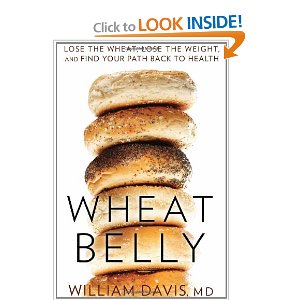
This superb book completely turns conventional wisdom about wheat (and grains) on its head, and it’s about time. Though many people are becoming aware of potential problems with gluten, Davis makes clear that there’s a l
ot more in modern wheat products that we need to be concerned with. Writing in a clear and readable style, Davis explains that the wheat we eat today bears little resemblance to the wheat our grandparents consumed, and why that should be of great concern to all of us. If you’ve ever wondered why bread can be addictive to so many people, or why wheat in particular tends to be fattening, or why you get brain fog after eating grains, this book will lay it all out for you. If you still believe all the standard American Dietetic Association talking points about “whole grains” and “whole wheat”, reading this book may give you a much different perspective. And if you’re looking to lose weight, it’s a must-read.
Sugar Nation by Jeff O’Connell
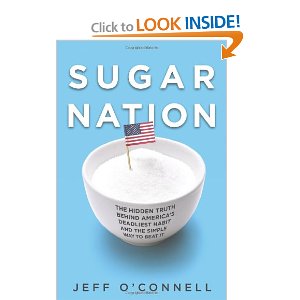
“Sugar Nation” was actually written before 2012, but it’s one of the most important books you may never have heard of. O’Connell’s story is personal, entertaining and incredibly informative. He’s a well known writer and editor (formerly of Muscle and Fitness, currently of Bodybuilding.com) who’s 6’5” and exercises religiously, yet he found himself with a diagnosis of Type ll Diabetes.
“Sugar Nation” tells the true story of what has happened to the US food supply over the past decades. In his quest to understand how he wound up with diabetes, O’Connell takes us on a journey, which includes interviews with some of the leading experts in the low-carb community. In this highly readable book you’ll learn about the politics of sugar, and a lot about why our nations leading “health” organizations (like the American Diabetes Association) don’t take a firm stand on avoiding it. And you’ll learn how sugar really impacts our health.
Fat Chance by Robert Lustig, MD
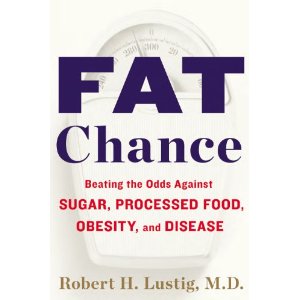
Lustig is a Professor of Pediatrics at the University of California at San Francisco whose lecture on sugar was a surprise viral hit on YouTube, garnering almost 3,000,000 views and landing him a book deal. “Fat Chance” is the book, and it’s one of the most important books on nutrition I’ve read in a long time.
If you’ve seen Lustig’s YouTube lecture—called “Sugar: The Bitter Truth”, you won’t be surprised at the subject matter, but you’ll be fascinated by the detailed, well-argued case Lustig makes against fructose as the number one promoter of metabolic dysfunction and obesity. Particularly brilliant are the sections on leptin and appetite regulation. Read this book and you’ll never again fall for any of the “Sweet Surprise” propaganda about how fructose is perfectly harmless. It’s not. Read this book.
Why We Get Fat by Gary Taubes
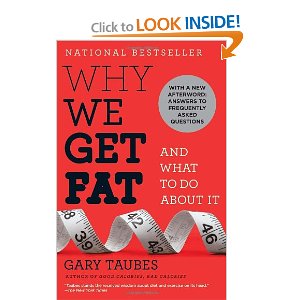
“Why We Get Fat” is a book that truly sets conventional wisdom about overeating on its ear. Taubes convincingly argues that the traditional thinking about obesity has the equation backwards. “We don’t get fat because we overeat,” he says, “we overeat because we’re getting fat”. Sound crazy? It’s not. Through detailed, well-reasoned arguments, Taubes shows that hormones and enzymes promote obesity, and overeating is the result. Scientifically accurate and yet counter-intuitive, this book will change the way you think about calories and over-consumption. It’s one of the best arguments I’ve ever seen for lower carb diets and explains in details why it’s carbohydrates—not calories—that’s driving the obesity epidemic. If you haven’t read Taubes, one of the best science writers of this generation, this is a great place to start.
The Great Cholesterol Myth by Jonny Bowden and Stephen Sinatra, MD
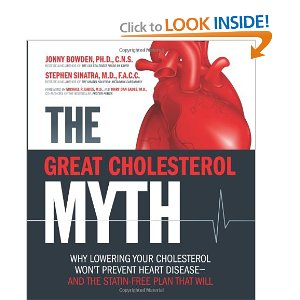
OK here’s the disclaimer I promised: I wrote this book, so of course I want you to buy it and read it. But that’s not why it’s on this list. It’s on this list because I honestly believe it has the power to change how we think about diet, heart disease and cholesterol.
It’s definitely the most important book I’ve ever written.
Cholesterol-phobia has informed all the dietary recommendations from major health organizations and from the USDA for over 30 years, and the obesity and diabetes epidemics are a direct result of those shifts in eating patterns. After all, where did the crazy “low-fat” diet come from? Fear of fat because it “clogs up your arteries” (not true) and it raises cholesterol (true but not in the way you think!)
But what if cholesterol were not a cause of heart disease? What if statin drugs were far more dangerous than you’ve been led to believe? What if lowering cholesterol didn’t save lives? And what if our emphasis on lowering cholesterol (with drugs that have a list of side effects as long as your arm) was misplaced and caused us to take our eye off the real causes of heart disease, things we could easily do something about without taking statin drugs?
That’s the thesis of this book, and it’s supported with well over 200 citations from peer-reviewed scientific papers. We’re certainly not the first health professionals to call the cholesterol myth “the greatest scam ever perpetrated on the American public”, but we feel we make the case in the clearest and most accessible way.
The book will be featured on a special Dr. Oz show to be aired on Christmas Day.
If you know anyone who has heart disease, is afraid of getting heart disease, is on a statin drug, or is generally concerned with their overall health, please give them this book. It has the potential to save their lives.
Spend some time with each of these five books and I can promise you you’ll know more about the real risks to your health than half the health professionals in America. Better yet, you’ll have a clear understanding about what to do about them.








Leave A Comment